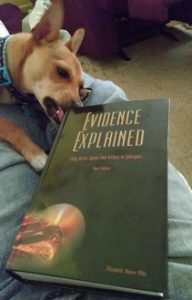 Two excellent ways to strengthen your research is to write it up and to cite what you write.
Two excellent ways to strengthen your research is to write it up and to cite what you write.
It is especially true on a person or family that is giving you difficulties. Write for an imaginary reader that does not know anything about the family. Explain what you know, how you know it, and where you got it.
Give reasons for your conclusions.
Have a source or reference for every statement of fact that you make. Re-evaluate those statements you can’t document.
Writing for someone else to read and understand often helps us to get at errors or omissions in our research.
Citing our sources frequently does the same thing.
You don’t have to be as dogged as Riley in citing your sources, but some attention to them will strengthen your research. These manuals will help:
- Genealogical Standards of Evidence: A Guide for Family Historians–a little easier on the book budget and good for those getting their citation feet wet
- Evidence Explained: History Sources from Artifacts to Cyberspace 3rd Edition Revised








2 Responses
“Explain what you know, how you know it, and where you got it. Give reasons for your conclusions.” Excellent advice! I wish I had done this for my own notes, rather than just recording the information of born, died, married, etc. After researching for many years, memory is not much help when reviewing my older information!
This post is an excellent reminder, thank you. Another thing I have found, if by reading out loud what you have written, the errors really show up as it sounds wrong. When you just read, our brains often skip the errors.